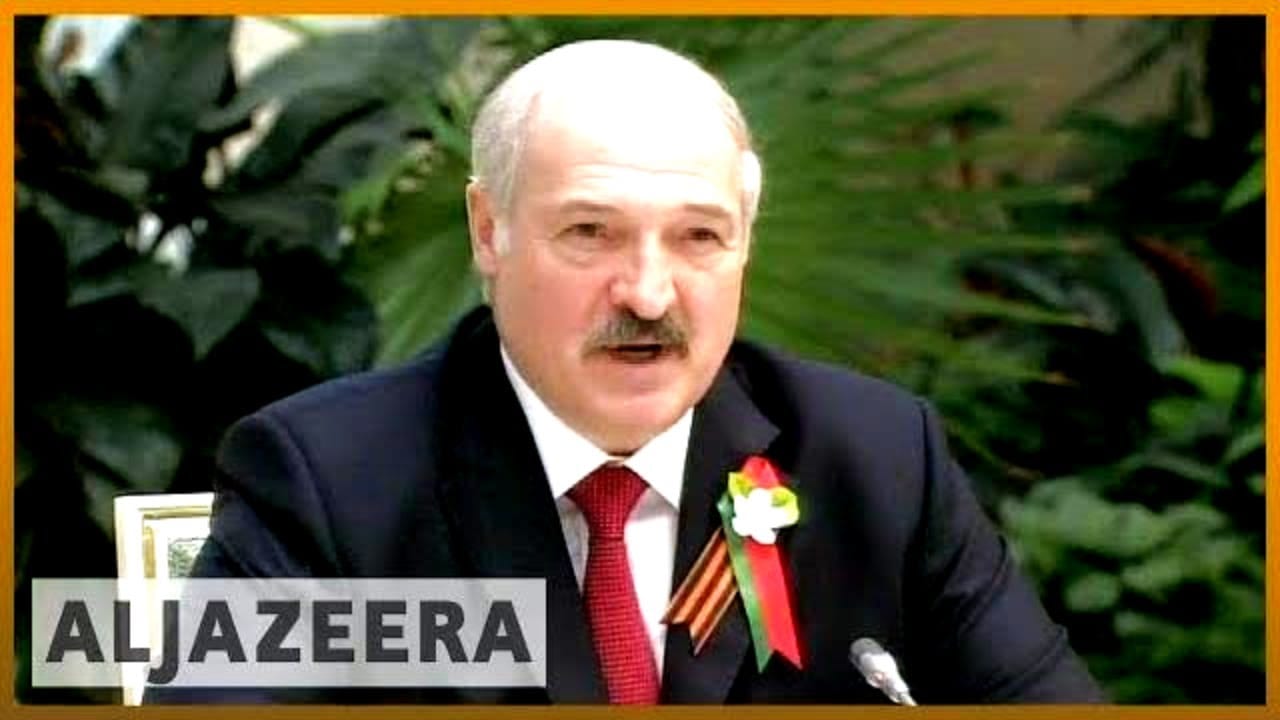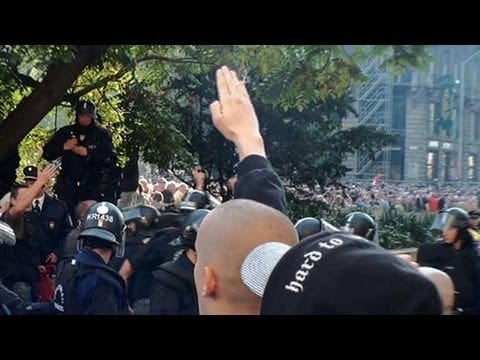Moscow refuses to adhere to the decision of the International Tribunal The UN
Author: RobertBart

Russians have a proverb – ‘Mend your sails while the weather is fine’, this means that success of the business largely depends on preparation for it.
It seems that the Russian president is far from disregarding this conventional wisdom especially given the fact that he has a power over a huge and resourceful state in his hands and he needs to retain it in the times of aggravating crisis. Therefore, the country leaders often use mythical threat from the outside as mobilization strategy.
Despite of the record votes gained by Putin following spring 2018 elections, people’s dissatisfaction with his domestic policy grows proportionally to exaggerating of economic and social problems: fall of manufacturing, rapid tax growth, unpopular pension reform, restriction of civil liberties, abrupt fall of people’s income etc. Still there is a little cause for optimism, even despite of a tendency towards increase of oil prices, which is the main resource fundamental for the Russian economy for many years.
Kremlin realizes that only success beyond the state may distract people’s attention and boost state leader’s rating. It is proven by Russians’ response to annexation of the Crimea in 2014, when Putin’s rating skyrocketed (86%). However, Kremlin is aware that today a “small victorious war” abroad bears certain risks especially for the state, which has already got bogged down in East Ukraine and Syria facing sanctions and international isolation. Authorities decides to act quietly and, whenever possible, using non-military methods.
Present Kremlin’s rhetoric suggests the conclusion that Belarus will become the next candidate for Russia’s “foreign policy success”. For a long time, its independence from Russia has been nominal. Though both states exist within association named the ‘Union State’, Belarus depends on Russia economically, in particular, in supply of the Russian oil (at below market price), which makes one of the sources of budget income after its processing and reselling to the foreign markets. As a result, Lukashenko is bound to correlate his internal and foreign policy with Moscow. While the Belarusian President affords criticism towards the Russian authorities from time to time, he always supports Kremlin’s actions in the international field. Resonance UN votes on issues disputable for Russia may serve as a prove as far as the Belarusian delegation has always taken the part of Moscow.
Quite recently, in the middle of December, 2018, the Russian Prime Minister Medvedev demanded from the Belarusian leadership in rigid, almost categorical manner strengthening of “integration” between two states. Referring to the treaty on the ‘Union State’, the head of the Russian government declared the beginning of the process of supranational structure’s creation for implementation of the unified legislation and tax system. By the way, the treaty provides establishing a single parliament and creation of single currency and national symbols.
To tell that Minsk was taken aback by such statement – not to tell anything. The Belarusian President urgently arrived to Moscow to negotiate with Putin, but apparently, they did not yield desirable result. And four bags of the Belarusian potato presented by Lukashenko to the Russian colleague did not help. The Belarusian President counted that he will manage to ensure smooth transition of the power to “crown prince” (the illegitimate son Nikolay) …
All these are jokes, but in fact, a process of Belarus absorption has already started. Certainly, it is not a question for one day, but Putin has quite enough time for implementation of his plans. This process most likely will have been completed by 2024 and the same year the next presidential elections are taking place in Russia. Probably Putin counts that peaceful “accession” of Belarus will allow to improve his personal rating, to distract attention of electorate and under the guise of elections of the head of new ‘Union State’ to carry out safe transit of the power. Let’s say once again, the Kremlin does not consider an option of force accession of the neighboring state today, and intends to make everything silently and, as if, voluntary. Naturally, in so doing nobody will ask the opinion of the Belarusian leadership and, in particular, of the Belarusian people…
Except for obvious ignoring of all international standards and laws such absorption bears in itself serious threats for safety of the European continent. First, Russia receives some kind of military base, especially in opposition against Ukraine and the Baltic states. Secondly, it strengthens its position in the European market as exclusive supplier of energy carriers, having an opportunity to dictate its terms. Such silent annexation is dangerous, because it also stimulates the aggressor to further actions. It is worth reminding that in the thirties of the last century a well-known tactics of “pacification of an aggressor” allowed Hitler at first to seize some countries without blood and any consequences and then to launch the world war resulted in tens of millions of victims and the destroyed continent. Therefore, perhaps, it is worth changing tactics of a pacification of an aggressor to more effective measures for preventing grand plans of Kremlin’s “gatherer of the lands”, otherwise it may be …

Jews of Hungary are revolted with the anti-Semitic magazine’s picture aimed against a local Jewish Community.
The business magazine Figyelo images the President of the Federation of the Hungarian Jewish Community showered with cash. The Hungarian Jewish Community began to seethe. It worth mentioning that the magazine appeared shortly after the Prime Minister of Israel gave praised to his Hungarian counterpart for fight against anti-Semitism.
An article published in this pro-government magazine, which owners are close to the Prime Minister of Hungary Viktor Orbán, alleged that the President of the Hungarian Jewish Community András Heysler was involved in financial frauds.
The political adviser of Benjamin Netanyahu met the ambassador of Hungary in Israel and condemned attacks to Mr. Heysler. He also told the ambassador that Israel demands the Hungarian government to denounce any cases of anti-Semitism manifestation.
The opposition leader Tzipi Livni (Zionist Union) condemned the publication, having declared, that “the Israel government has to fulminate immediately these anti-Semitic attacks and to lead fight against anti-Semitism”.
The American Jewish Committee (AJC) also condemned the Hungarian magazine. “Jews with cash is a well-known shameful anti-Semitic cliché”, – said rabbi Andrew Baker, the Director of International Jewish Affairs at the AJC and a Personal Representative of the OSCE CiO on Combating Anti-Semitism.
The Hungarian Jewish Community splits over controversial Holocaust museum, which Viktor Orbán plans to open next year in commemoration of the 75th anniversary of the Hungarian Jews deportation to Auschwitz. More than half a million Hungarian Jews were killed during WWII.
The Hungarian government finances the museum, which will belong to the Unified Israelite Congregation of Hungary headed by the rabbi Slomo Koves from Chabad.
The project under the name House of Fates started in 2014 and immediately caused criticism on the part of organizations and individuals, including the Israeli memorial and research center “Yad Vashem” and the President of the Hungarian Jewish Community András Heysler. Critics of the project are afraid that the role of Hungarians in prosecution and deportation of Jews will be shaded in this museum, the history in general will be garbled, and thus the museum will become the political tool in hands of the right nationalist Hungarian government.
“We repeatedly asked to provide us a complete description of an exposition that we could take part in this project with all responsibility. But we have received nothing yet”, – said András Heysler in his interview to the American news agency Bloomberg last October.
Supporters of the government say Viktor Orbán has already recognized Hungarian crimes of Jews during the Holocaust and he is not going to shade these facts. In 2017, after a meeting with Benjamin Netanyahu in Budapest, Mr. Orbán told: “During WWII actions of Hungary did not meet moral and political standards. It is a sin because instead of protecting Jews, we preferred to cooperate with Nazis, – Orbán continued. – I let know Mr. Netanyahu that it would not never repeat, in the future the Hungarian government would protect all the citizens”.
However, actually Mr. Orbán’s attitude to the past of his country and Hungarian Jews is much more difficult. In 2017, the Jewish community flayed to Viktor Orbán after he had given praise to Miklos Horthy (the regent of Hungary and Nazis collaborator during WWII). Mr. Orbán called Horthy and other Hungarian leaders “the conspicuous statesmen” directing the country after the Austro-Hungarian Empire. Mr. Orbán also carried out the campaign directed against the Hungarian-Jewish business magnate George Soros.
by Ofer Aderet, Noa Landau, Haaretz
https://www.haaretz.com/world-news/europe/.premium-hungary-s-jews-rail-over-anti-semitic-magazine-cover-targeting-their-community-head-1.6702398
